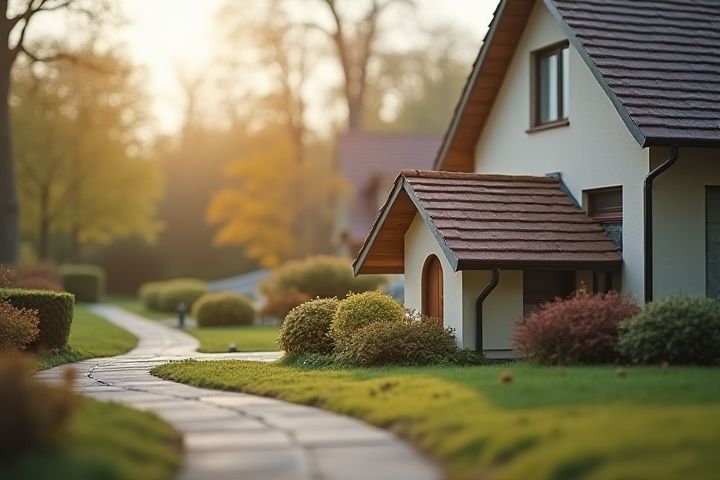
Houses appreciate in value primarily due to factors such as location, demand, and economic growth. When a neighborhood experiences an influx of new businesses, schools, and amenities, property values often rise as more buyers seek to live in that area. Additionally, inflation and the increasing cost of construction materials contribute to the overall appreciation of real estate over time. Factors like low interest rates can also spur more buyers into the market, driving up demand and, consequently, prices. Your investment in property may yield significant returns if you choose a location with strong appreciation potential.
Why Do Houses Appreciate In Value
Supply and demand balance
Houses appreciate in value primarily due to the balance of supply and demand in the real estate market. When demand for homes exceeds the available supply, prices naturally rise; for example, in a competitive market with low inventory, home prices can increase by 10-20% over a few years. Conversely, if the supply of homes outpaces demand, such as during economic downturns or increased construction, prices may stagnate or decline. Understanding this dynamic can help you make informed decisions about home buying and investments.
Economic growth
Houses tend to appreciate in value due to significant economic growth, which often drives demand for housing. In regions where local economies are expanding, employment opportunities increase, attracting new residents and boosting homebuyer confidence. According to the National Association of Realtors, a 1% increase in job growth can lead to a 2% rise in home prices within that area. Furthermore, low interest rates, often seen during economic upswings, make mortgages more affordable, further enhancing homebuying activity and pushing property values higher.
Inflation effects
Houses often appreciate in value due to the impact of inflation on the real estate market. As inflation rises, the purchasing power of money decreases, prompting buyers to invest in tangible assets like real estate. Historical data shows that, on average, home prices increase by about 3-5% annually, which often outpaces inflation rates. This appreciation provides a hedge against inflation, allowing your investment in property to potentially grow in value over time.
Location desirability
Houses often appreciate in value primarily due to their location desirability, which encompasses factors like proximity to excellent schools, parks, shopping centers, and employment opportunities. For instance, neighborhoods with low crime rates and well-maintained infrastructure typically see a significant increase in demand, pushing property values higher. According to studies, homes located within a one-mile radius of high-rated schools can appreciate up to 25% more than those situated farther away. Ultimately, when you invest in a desirable location, you are more likely to see a positive return on your real estate investment over time.
Interest rate impact
Interest rates significantly influence house appreciation by affecting mortgage affordability and buyer demand. When interest rates are low, borrowing costs decrease, making it easier for buyers to finance homes, which can lead to increased competition and higher property values. Conversely, when rates rise, the cost of borrowing escalates, potentially cooling demand and slowing appreciation. This dynamic creates a direct correlation between interest rate changes and the real estate market, impacting both current homeowners and prospective buyers.
Urban development
Urban development significantly contributes to the appreciation of house values, primarily due to increased demand for housing in growing metropolitan areas. Cities often invest in infrastructure improvements, such as public transportation, parks, and schools, which enhance the overall quality of life and attract potential homeowners. According to recent statistics, properties located within a 5-mile radius of new urban developments can experience a value increase of up to 15% over five years. As urban areas become more desirable, the competition for limited housing supply drives prices higher, making your investment in such properties particularly lucrative.
Renovations and upgrades
Houses have the potential to appreciate in value significantly due to renovations and upgrades, which can increase both functionality and aesthetic appeal. Data indicates that kitchen remodels can yield a return on investment (ROI) of approximately 80%, while bathroom upgrades may provide an ROI of over 70%. Energy-efficient improvements, such as new windows or HVAC systems, not only lower utility costs but also attract eco-conscious buyers, enhancing the overall market value of your property. Furthermore, enhancing curb appeal through landscaping or exterior updates can result in a remarkable increase in home value, reflecting the importance of strategic renovations.
Historical appreciation trends
Historical appreciation trends reveal that houses often appreciate in value due to factors like location, economic growth, and demand-supply dynamics. According to the Federal Housing Finance Agency, homes in the United States appreciated by an average of 3.5% annually over the past 50 years, highlighting a consistent upward trajectory. Urban areas, especially those with robust job markets and amenities, tend to see even higher appreciation rates, sometimes reaching 8-10% per year. Your investment in real estate can benefit from these trends by capitalizing on long-term growth potential in desirable neighborhoods.
Zoning and regulations
Zoning laws and regulations significantly impact property values, often determining the allowable use of land and the density of development. Areas with favorable zoning, such as residential or mixed-use designations, tend to see higher demand, which drives up home prices. For instance, properties located in regions with strict zoning regulations may benefit from reduced competition, leading to increased attractiveness for buyers. Understanding the zoning in your area can help you make informed decisions about real estate investments and potential appreciation.
Community infrastructure
Community infrastructure significantly influences the appreciation of house values, with well-developed amenities attracting homebuyers. Areas with strong transportation links, such as highways and public transit systems, often see a 10-20% increase in property values compared to those without. Additionally, proximity to quality schools, parks, and recreational facilities can lead to a 15% rise in real estate prices. Safe neighborhoods with active community programs tend to stabilize and enhance home equity, making your investment more resilient over time.
